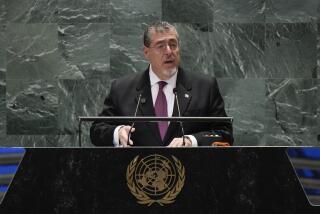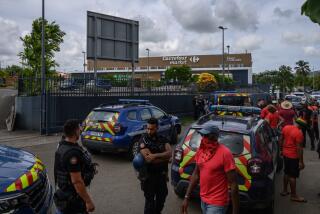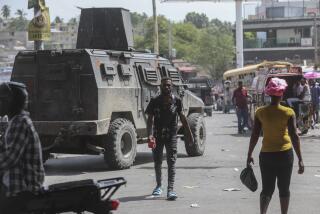U.N. to Deploy Emergency Forces in War-Torn Congo
UNITED NATIONS â Striving to avoid a repeat of massacres under the U.N.âs watch in Rwanda and Bosnia, the Security Council on Friday authorized a new multinational peacekeeping force for war-ravaged Congo.
The French-led force of about 1,200 troops will begin arriving next week in the northeastern town of Bunia to back up U.N. peacekeepers who have been unable to prevent waves of killing by rival ethnic militias. The new troops are authorized to use force to protect civilians and will stay in Bunia to provide security until a fresh U.N. task force arrives from Bangladesh in mid-August.
U.N. Secretary-General Kofi Annan asked France this month to lead an international force to protect Congoâs civilians from warring militias and ethnic violence. Between 800 and 1,000 troops will come from France, with Britain, South Africa, Nigeria and Pakistan and others also likely to send soldiers.
The U.S. will not send troops. It may provide logistical or financial help if formally asked, a spokesperson for the U.S. mission said Friday.
Some council diplomats said the Iraq war had unfairly put the African crisis on the back burner. The Security Council postponed a delegation to West Africa scheduled for earlier this month to focus on Iraq sanctions. Two council missions will travel to Central and West Africa in June, and then, African diplomats hope, translate their observations into action.
âOne lesson we have learned in situations like the Congo is that sending an observer mission is clearly not the answer,â said Ismael Gaspar Martins, Angolaâs ambassador to the U.N. âWe needed a more robust response.â
He added that he was pleased that after the diversion and division of the Iraq issue, ambassadors had turned their attention back to other parts of the world. âIâm glad that Africa offers a real way for the council to unite over preventing conflict,â he said.
French Ambassador Jean-Marc de la Sabliere said he was happy to see the council working together again. âWe have had some differences on Iraq,â he said. âBut on Africa, weâve had very, very strong cooperation.â
The conflict in Congo stretches back nearly five years as tribal militias and their sponsors from neighboring countries fought over the countryâs riches: diamonds, gold, timber and even coltan, a mineral used in cell phones. It has become known as Africaâs World War, because it involved so many nations and so many deaths. More than 3 million people have been killed in the fighting or from ripple effects -- disease, displacement and starvation.
A peace deal that called for the withdrawal of Ugandan troops this month left a power vacuum in Bunia that rival warlords rushed to fill, leading to atrocities.
Reminiscent of Rwanda, where hate radio fanned the genocide, the ethnic Hema militia group has broadcast warnings of force against rival Lendu members, U.N. peacekeepers reported.
The ethnic fighting has led to systematic violence against women and children, and there are millions of others in Ituri province, which includes Bunia, outside the reach of aid workers, said Carolyn McAskie, the U.N. deputy emergency relief coordinator, who visited the area last week. âThe rape of women has become systematic, a weapon of war,â she told a U.N. news service in Kinshasa, the capital, after her visit.
The 700 Uruguayan U.N. peacekeepers stationed in Bunia are lightly armed and have been unable to do much to stop the bloodshed. As many as 17,000 people have thronged a razor-wired U.N. compound, setting up a tent-camp on its grounds.
The pattern is eerily similar to the plight of the blue helmets in Bosnia and Rwanda who watched thousands of civilians who were seeking U.N. protection be slaughtered.
De la Sabliere reminded the Security Council on Friday that though efforts to restore peace in the Congo over the years âhave been frustrating,â the council must act to end an intolerable situation.
âAs measures to bring about a cease-fire were put in place, the conflict seemed to adapt to them and become worse in a different form, a bit like bacteria developing resistance to the medication used against them,â he said.
But the complexity âis not a reason to give up,â he said. An international presence can add pressure, but it canât force peace.
âThe first thing is to make all parties to the conflict ... realize that this is âtheirâ peace process. No one else will be able to achieve peace for them.â
More to Read
Sign up for Essential California
The most important California stories and recommendations in your inbox every morning.
You may occasionally receive promotional content from the Los Angeles Times.










